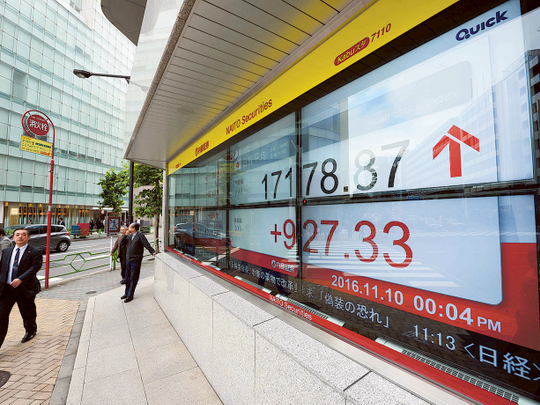
Dubai: Investors will focus back on fundamentals after witnessing Trump induced volatility.
Equity markets across the world witnessed a massive sell-off on early Wednesday, but markets were quick to find lost ground as traders snapped up bargains in a volatile market.
The Nikkei was down 5 per cent on Wednesday, so were the S&P futures, which fell more than 5 per cent, Gold surged more than $50 (Dh183.50) an ounce at one point, while US bond yields jumped to over 2 per cent.
But fund managers are asking investors now to focus back on fundamentals.
“We expect the US equity market to do well over the medium term. Fundamentals should outweigh political uncertainty and US stocks can rebound on the back of accelerating earnings per share (EPS) growth,” Max Kunkel, ultra high net worth investment strategist at UBS Wealth Management told Gulf News over email. He expects the earnings per share to rise to 8 per cent from 1 per cent this year.
Even the US’ GDP has shown signs of a revival. The US economy grew at a 2.9 per cent rate in the July-September quarter, the strongest pace in two years.
The fast growth along with expansionary spending may boost equities further. US president elect Donald Trump in his speech to his supporters said his priority would be to rebuild infrastructure, including airports, bridges, with room for increasing fiscal expansion & boost domestic employment.
“We believe, businesses, especially those focused on national defence infrastructure, could enjoy advantages from more expansionary fiscal policy,” Kunkel said.
“The greater likelihood of expansionary fiscal policy in the US benefiting GDP growth should shift the focus somewhat,” said Kunkel, adding, “a deteriorating fiscal outlook could push up government borrowing costs and thus lead to higher treasury yields”.
Emerging market currencies
UBS remains overweight in emerging market equities and currencies.
“Key drivers include overall accommodative monetary policy and low yields in advanced economies, undemanding valuations in emerging market currencies, and some improvement of fundamentals in the developing world,” Kunkel added.
But one of the impacts that may be witnessed could be an acceleration in inflation, which might rise faster than the interest rates, providing negative yields, and may benefit gold prices.
“Gold will likely continue to benefit from deeper negative real rates in the US, with inflation rising faster than interest rates,” said Kunkel from UBS. Gold traded near to $1,300 an ounce, after gaining more than $100 per ounce since Brexit.
Fund managers also advise investors to take refuge in the inflation hedge instruments. UBS is overweight in US TIPS (Treasury Inflation-Protected Securities) relative to high grade bonds, which is expected to benefit from the election result.
Over the long run, Aberdeen Asset Management Head of Equities Asia Pacific ex-Japan Flavia Cheong feels Trump-inspired protectionism might force Asian countries to accelerate their efforts to shift from export-led growth models to more consumption-based models. “For example, China would finally have the catalyst it needs to fully embrace the painful structural overhaul it has promised.”
“This could end up benefiting our regional holdings because, as our clients will know, the majority of our investments are in businesses that are set to take advantage of growing domestic consumption,” Cheong said.
Euro/dollar
UBS has an overweight position in the euro relative to the US dollar. The euro is around 12 per cent undervalued relative to purchasing power parity based on UBS’ estimates.
“We believe there are indications that the Fed may be falling behind the curve in raising interest rates — wages are growing at the fastest pace in more than five years, and inflation stands at a two-year high,” Kunkel said.
These trends, according to the UBS will potentially be exacerbated if the Fed allows for a more “high pressure” economy over an extended period. Meanwhile, economic fundamentals in the Eurozone continue to
improve, and the European Central Bank remains likely to taper its quantitative easing programme in 2017.












